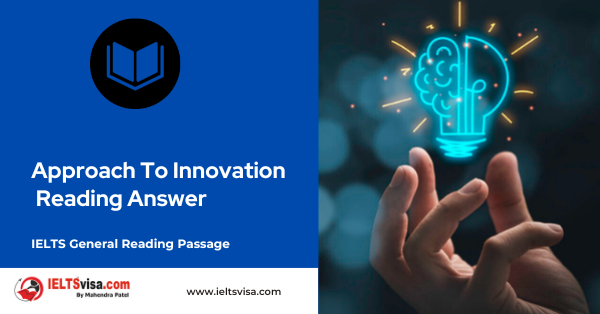Approach To Innovation Reading Answer
IELTS General Reading Passage
People tend to think that any new technology or device is an act of genius; something that has required vision and insight to create and then develop into a marketable product. The fact is that innovations were often already ‘out there’ in the public domain in some form or another. They tend to evolve from notions that have been around for years but that had not, until that point, been suitably adapted. One expert calls this the ‘long nose’ approach to innovation, whereby new concepts come into the world slowly, gradually revealing all they have to offer.
Question 1
Read the text and answer the question by selecting the correct response.
Choose the correct letter, A, B, C or D.
Write the correct letter in box 1 on your answer sheet.
1. What is the writer’s main point about innovation?
A. Many new products fail to interest consumers.
B. New products are not always based on new ideas.
C. Creators of new products require a unique set of skills
D. New products are easy to distinguish from old ones.

Solution:Approach To Innovation Reading Answer
| 1. B |
Review and Practice
- Regularly practice with IELTS reading samples and time yourself to get used to the pressure of the exam.
- Review your mistakes to understand where you went wrong and how to avoid similar errors in the future.
Our Books
Master IELTS Speaking Part 1
IELTS Writing Task 1 Book
IELTS Writing Task 2 Book
Approach to innovation Reading Answer Explanation
| Question NO | Question Type | Answer | Keywords | Supporting Sentence | Location of Keywords | Explanation |
|---|---|---|---|---|---|---|
| 1 | Main Idea | B | innovation, existing ideas | “Innovations were often already ‘out there’ in the public domain in some form or another.” | First sentence of the paragraph | Innovations tend to evolve from pre-existing ideas that have been circulating for years but were not yet adapted properly. |
Practice IELTS Other Modules
IELTS Listening
The IELTS Listening test assesses how well you can understand spoken English in various contexts. It lasts about 30 minutes and is divided into four sections with a total of 40 questions. The listening tasks become increasingly difficult as the test progresses.
IELTS Academic Reading
The IELTS Academic Reading section assesses your ability to understand and interpret a variety of texts in academic settings. It is designed to evaluate a range of reading skills, including skimming for gist, reading for main ideas, reading for detail, understanding inferences, and recognizing a writer's opinions and arguments.
IELTS Speaking
The IELTS Speaking test assesses your ability to communicate in English on everyday topics. It lasts 11-14 minutes and consists of three parts: introduction, cue card, and a discussion based on the cue card topic.
IELTS General Reading
IELTS General Reading tests your ability to understand and interpret various types of texts. Here are some key areas and types of content you can expect to encounter in the reading section, along with tips for effective preparation.
IELTS Academic Writing Task 1
In IELTS Academic Writing Task 1, you are presented with a visual representation of information, such as graphs, charts, tables, or diagrams, and you are required to summarize, compare, or explain the data in your own words.
IELTS General Writing Task 1
In IELTS General Writing Task 1, you are required to write a letter based on a given situation. The letter can be formal, semi-formal, or informal, depending on the prompt. Here’s a breakdown of the key components to include in your letter
IELTS Academic Writing Task 2
In IELTS Academic Writing Task 2, you are required to write an essay in response to a question or topic. Here’s a guide to help you understand the essential elements of this task
IELTS Exam Tips
To succeed in the IELTS exam, practice regularly, familiarize yourself with the test format, improve your vocabulary, develop time management skills, and take mock tests to build confidence.
Grammer for IELTS
Grammar is the foundation of effective communication in English. Understanding tense usage, subject-verb agreement, and sentence structure enhances clarity and coherence in writing and speaking.
Vocabulary for IELTS
Vocabulary plays a crucial role in the IELTS (International English Language Testing System) exam, especially in the Speaking and Writing sections. Here’s an overview of why vocabulary is important and how it impacts your performance
RECENT IELTS SAMPLES QUESTIONS AND ANSWERS
Becoming An Expert Reading Answer
A Expertise is commitment coupled with creativity. Specifically, it is the commitment of...
STUDY CENTRE COURSES Reading Answer
SELF-STUDY TIPS AHowever difficult you find it to arrange your time, it will pay off in the...
The Extrinct Grass In Britain Reading Answer
A The British grass interrupted brome was said to be extinct, just like the Dodo. Called...
Morse Code Reading Answer
A. A new satellite-based system is being implemented to replace Morse code for sending...
Magnetic Therapy Reading Answer
AMagnetic therapy, which is a $5-billion market worldwide, is a form of alternative medicine...
Lack Of Sleep Reading Answer
Section A It is estimated that the average man or woman needs between seven-and-a-half and...













